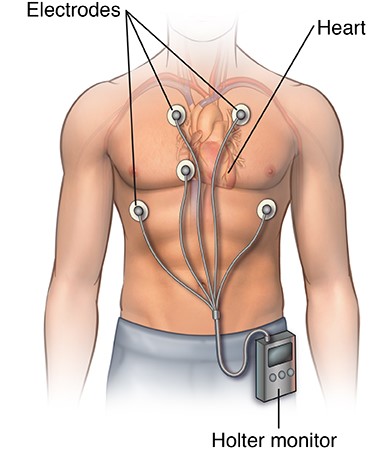Holter Monitor Screening: A Window into Your Heart's Rhythms
In cardiology, monitoring and understanding the intricacies of your heart’s behaviour is essential for maintaining good health and preventing potential issues. One remarkable diagnostic tool that accomplishes this is the Holter Monitor, which records your heart’s
pattern over an extended period, ranging from 24 hours to 2 weeks.
The Holter Monitor in a Nutshell
The Holter Monitor, named after its inventor, Dr. Norman J. Holter, is a portable device that continuously records the heart’s electrical activity over an extended period. Unlike a standard EKG that provides a snapshot of the heart’s activity during a brief test, the Holter Monitor offers a comprehensive view of the heart’s performance in real-life conditions. The device is connected to pain-free electrodes attached to the chest, making it comfortable and
non-invasive.
Detecting Elusive Abnormalities
The primary objective of Holter Monitor screening is to identify abnormalities in the heart’s electrical activity that may not be evident in a traditional EKG. Standard EKG tests are conducted in clinical settings and provide a snapshot of the heart’s rhythm at a specific
moment. They are ideal for diagnosing acute conditions and easily observable irregularities. However, some heart issues are intermittent, occurring unpredictably and infrequently, making them challenging to detect during a brief visit to the doctor.
On the other hand, the Holter Monitor provides a continuous recording of your heart’s electrical signals, making it well-suited to capture sporadic abnormalities.
These may include:
Arrhythmias: Some arrhythmias, such as atrial fibrillation or ventricular tachycardia, can be intermittent. They may not manifest during a routine EKG but can significantly affect your health. Holter Monitor screening can capture these episodes, enabling your healthcare provider to diagnose and treat them effectively.
Ischemia: Transient episodes of reduced blood flow to the heart muscle, known as ischemia, can be challenging to identify with a standard EKG. Holter Monitor testing can record these events and help your doctor determine the best course of action.
Heart Rate Variability: Holter Monitors can provide valuable information about heart rate variability, which reflects the adaptability of your heart to different situations. Abnormal heart rate variability can indicate underlying cardiac issues and may not be apparent during a short EKG session.
Continuity in Daily Life
One of the advantages of the Holter Monitor is that it allows patients to continue their routine while undergoing the test. This extended monitoring period provides a more accurate representation of your heart’s behaviour under everyday circumstances. You wear the compact device, typically the size of a small smartphone, and go about your daily activities. This includes sleeping, exercising, working, and even showering. The device is connected to electrodes on your chest, securely recording your heart’s activities day and night.
This continuity in daily life is invaluable for capturing irregularities that specific activities or events may trigger. For instance, a patient may experience palpitations during exercise but may not be detectable during a brief EKG performed in a clinic. The
Holter Monitor can capture such instances, helping healthcare providers make more accurate diagnoses and treatment decisions.
Data Analysis and Review
Once the monitoring period is complete, you return to the clinic to have the device removed, and the recorded data is analyzed. Your healthcare provider reviews the results, looking for abnormal patterns, irregular heartbeats, and other signs of cardiac issues. They
can then make informed decisions about your treatment, such as prescribing medications, recommending lifestyle changes, or further diagnostic tests.
The Holter Monitor’s continuous recording often reveals valuable insights that might not have been possible with a conventional EKG. It enables a comprehensive evaluation of your heart’s behaviour over time, which can be especially useful for individuals with unexplained
symptoms or those at risk of certain heart conditions.
The Holter Monitor in Practice
Holter Monitor screening is commonly used in various clinical scenarios:
Unexplained Symptoms: If you are experiencing unexplained symptoms like palpitations, dizziness, or chest pain, the Holter Monitor can help pinpoint the cause by capturing any irregularities in your heart’s electrical activity.
Assessment of Treatment: Holter Monitor testing can be part of an ongoing assessment for individuals with known heart conditions. It allows healthcare providers to evaluate the effectiveness of medications or other treatments and adjust them as
needed.
Risk Assessment: If you have risk factors for heart disease, such as a family history of heart conditions, the Holter Monitor can be a valuable tool for early detection and prevention.
Preoperative Evaluation: In some cases, the Holter Monitor may assess a patient’s cardiac health before surgery or other medical procedures.
Advancements in Holter Monitoring
The field of cardiology continues to advance, and so does the technology used in Holter Monitoring. At Reflex Medical Centre, we use the Newest devices that are more user-friendly, with improved battery life and data storage capabilities. This makes it easier for patients to wear the device for extended monitoring periods, increasing the chances of capturing intermittent abnormalities.
Holter Monitor screening is a powerful diagnostic tool that offers a unique window into your heart’s rhythms and can identify elusive abnormalities that might escape traditional EKG. Its non-invasive and continuous monitoring approach enables healthcare providers to make more accurate diagnoses and treatment decisions. With advancements in technology, Holter Monitors are becoming even more user-friendly and accessible, enhancing their utility in cardiology. The ability to go about your daily life while being monitored makes
this diagnostic tool is an invaluable asset in preventing and managing heart conditions, ensuring that your heart continues to beat strong and steady.
